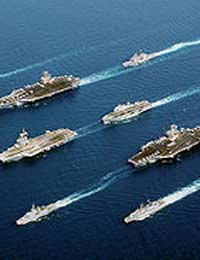Types of Military Careers

The military is defined as an organisation that is authorised by its country to use force, including weapons if necessary, to defend the country. Thus, the military refers to organisations including the Royal Air Force (RAF), the Royal Navy and the Army, which now encompasses the Territorial Army, too.
As military organisations are often ‘societies within societies’, virtually any job that is found in ‘real life’ is found in these fields. There are six core types of job available in the military, each of which require the passing of an entrance exam (the strictness of which depends on the type of role), a health and fitness test (again, the level of health and fitness required depends on the nature of the job) and a certain level of time commitment, ranging from six months to 12 years, depending on the cost of relevant training.
Combat Roles
All military operations have active combat roles. As a rule, these positions tend to demand the highest level of health and fitness, although that is not a blanket rule with, for example, the 20/20 vision demand no longer in place.Engineering Roles
There are a wide variety of Engineering Roles in each of the military services as the equipment, machinery and tools use need to be kept in good working order at all times. Consequently, engineers on all levels are required, including those for repairing, servicing and maintaining military vehicles and armourers to inspect and repair weaponry.HR & Finance
This is where a great deal of ‘civilian’ type roles comes into play, with the military needing all sorts of people to fulfil positions such as Recruitment, payroll and human resources. The type of experience required for these positions is largely the same as for comparative roles in the private sector, but with the added health and fitness tests in case of deployment. There is also usually greater security and potential career development in these roles in the military than in the private sector, with greater opportunity for travel and personal development training.Intelligence, IT and Communications
There are thousands of jobs in the intelligence, IT and communications sector of the military, particularly graduate jobs that offer the potential to quickly be promoted through the military’s ranks.Intelligence jobs offer great potential for graduates with an analytical mind, so economics, maths and politics graduates are especially in demand, although other subjects are welcomes. IT specialists are needed are the military bases in the UK and the overseas bases and missions, so there is a great chance for travel, although often to difficult geographical areas. Communications roles encompass the ‘PR’ side of the military as well as internal communications.


Re: Becoming a Paramedic
I would love to become the first aider and paramedic for working in the ambulance as the career in doing that role for me
Re: Finding Work Experience as an Adult
Hi. I have spent the majority of my career as a HCA. I was very good at it but last year I had an operation that left me…
Re: How to Become an Insurance Broker
So I have a lot people that want life insurance how do I become a insurance broker or even help someone by passing these…
Re: How to Become an Insurance Broker
I would like to become an insurance broker for cars, vans and taxi duo to the high request. Any suggestions? Please contact…
Re: Working with Animals
Good Morning. I am 55 years old and have been working in social care for the last 12 years. I have always loved animals and have a high…
Re: Becoming a Mechanic
I love this content, it was helpful, check this out also.
Re: Finding Work Experience as an Adult
Hi I'm 31 years old and have a disability I'm looking for work experience either in a nursery or as a receptionist at a…
Re: Finding Work Experience as an Adult
Hi i am looking for work experience in account assistant position. Thank you
Re: Finding Work Experience as an Adult
Hi I am looking for work experience in account assistant as I am having Acca and BA degree qualifications. I am available…
Re: How to Become an Insurance Broker
Hi We would like to start private hire insurance business. I need more information about this. Can you please contact me…